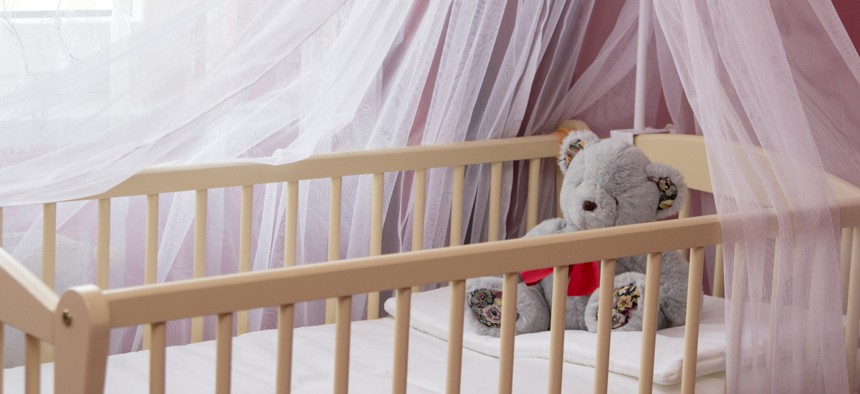Nothing Can Alleviate the Pain of a Stillborn Baby. But States Consider Helping with Parents' Financial Burdens

Stillbirth is relatively common, affecting 1 in 100 pregnancies in the U.S. But those babies are rarely acknowledged in any official way. Shutterstock
Several states have passed laws allowing parents of stillborn babies to claim tax credits. Several others have proposed it.
Early on the morning of Oct. 4, 2013, Samantha Durante Banerjee gave birth to a 6-pound-8-ounce baby girl. Alana Marie was 20 inches long, and had black hair, soft skin, and long, slender fingers, with perfect, tiny fingernails. Her parents cradled her, drinking in each detail.
“We held her for about an hour,” said Banerjee, who lives in Katonah, New York. “They took some photos of her with us. And then we basically said goodbye.”
After 39.5 weeks of a healthy, normal pregnancy, Alana was stillborn. Stillbirth—defined as the death of an infant before or during delivery after at least 20 weeks of gestation—affects 1 in 100 pregnancies in the U.S., or roughly 70 babies per day, according to federal data. But it remains largely invisible, a private tragedy that families weather in silence. Banerjee, a self-described pregnancy expert, had done extensive research on healthy prenatal habits and natural childbirth. None of it had prepared her for the possibility.
“We had a couple of hours to make a lifetime of memories,” she said. “We had no idea that this could happen so late in a healthy pregnancy. I do not even remember hearing the term ‘stillbirth’ until I got home from the hospital. How can you expect anybody to protect themselves against something they don’t know exists?”
Pregnancies that end in stillbirth begin normally, with expectant parents who go through all the rituals of preparation. They paint nurseries and host baby showers. They select names and fold tiny socks and write in baby books. Later, after their babies’ heartbeats stop, their mothers must still deliver them. But because those babies never draw breath, they are typically not acknowledged in any official way.
Stillborn babies are not issued birth certificates. Insurance policies don’t always cover the cost of their delivery or follow-up tests, including autopsies, to determine a cause of death. Parents are not allowed to claim their infants as dependents and do not receive the child tax credit afforded to other families, even those whose child dies shortly after birth. It is, in many ways, like the baby was never there at all.
“If your baby is born alive, even just for a moment—if they take one breath, make one movement, have one pulse in their umbilical cord or show one heartbeat, they count as having lived and died,” Banerjee said. “Whereas a baby like my daughter, who was born only two days before her due date—it’s as if she never existed.”
Across the country, legislators have sought to remedy that. A handful of states now allow parents of stillborn infants to receive tax credits to help offset the financial cost of hospital bills and funeral preparations. The details vary—some states, like North Dakota, allow parents to receive the same tax deduction they could claim for a living child, while others, like Minnesota, provide for a fixed credit. Similar policies are underway in several other states, including Iowa, Wisconsin, Ohio and New York, where Alana was born.
That proposal, which would grant a $2,000 refundable tax credit to families who experience a stillbirth, is the work of Banerjee and her legislators, state Rep. David Buchwald and state Sen. Shelley Mayer, both Democrats. The bill, awaiting a hearing before the Senate Budget and Revenue Committee, aims to help distraught families recoup some of the financial cost of their losses, but the proposal has other benefits as well, Mayer said.
“It is a recognition of some of the financial burdens that these families face, but it’s also an acknowledgement of the experience,” she said. “(Stillbirth) is much more frequent than people know, and there’s not enough research or understanding. It’s a topic that isn’t really discussed, so this is an effort to bring that into the open.”
That public, binding acknowledgement is key, said Banerjee. Leaving the hospital without her daughter was traumatic, but having to hear months later, from her accountant, that the state did not formally recognize Alana’s existence was yet another glancing blow.
“Obviously, no amount of money is going to ease the pain of losing your child,” she said. “The one thing this can ease is to give you some acknowledgement that your baby existed, that your baby counted, that New York state cares that you had a child, and they lived however long inside your womb, and then they died. It was really, really painful to hear my accountant say, ‘I’m so sorry, but your baby doesn’t count.’ The acknowledgement is worth more than any dollar amount.”
Stillbirth legislation in other states has passed with broad bipartisan support, as in North Dakota where it was approved unanimously. Mayer’s proposal is at the beginning of the legislative process, she said, “but I think there’s a tremendous concern in the health community that this is an issue that does deserve more attention.”
That attention is perhaps what matters most to parents, Banerjee said.
“Even if the bill doesn’t pass, we have thousands more people who now know that stillbirth happens,” she said. “They can have the opportunity that I never had—to learn more about it, and learn what they can do to protect their babies.”
Kate Elizabeth Queram is a Staff Correspondent for Route Fifty and is based in Washington, D.C.
NEXT STORY: College Towns Are Struggling with Game-Day Housing Demands





